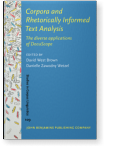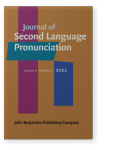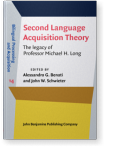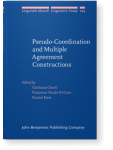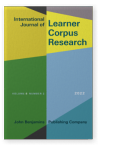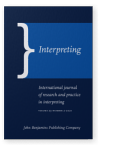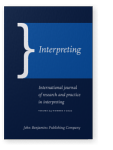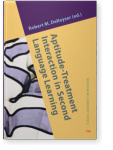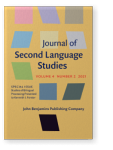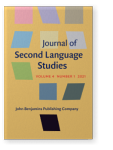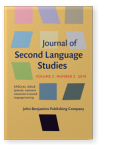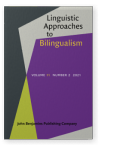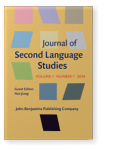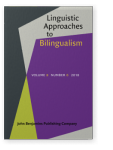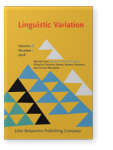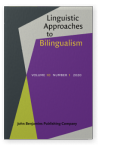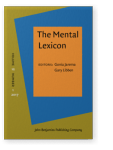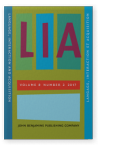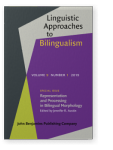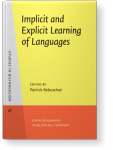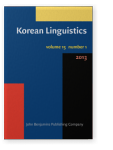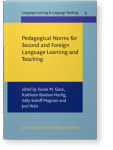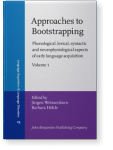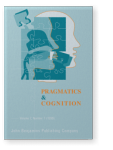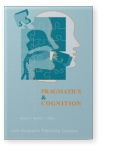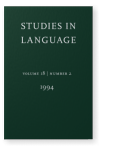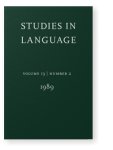University of Maryland, College Park
List of John Benjamins publications for which someone affiliated with University of Maryland, College Park plays a role.
Title
2023 Strategic language as a family
of identity-based discourse registers: Hillary Clinton and the president’s task force
on national health reform, 1993–1994
of identity-based discourse registers: Hillary Clinton and the president’s task force
on national health reform, 1993–1994
In: Corpora and Rhetorically Informed Text Analysis: The diverse applications of DocuScope[Studies in Corpus Linguistics, 109] pp. 239–263
Keywords Clinton administration | Hillary Clinton | strategy | health care | discourse register | role identity | interest groups | automatic text analysis | digital humanities
2022 Pseudo-coordination and ellipsis: Expressive insights from Brazilian Portuguese and Polish
In: Pseudo-Coordination and Multiple Agreement Constructions[Linguistik Aktuell/Linguistics Today, 274] pp. 169–190
Keywords pseudo-coordination | ellipsis | expressive language | verb-echo answers
2023 On learner characteristics and why we should model them as latent variables
Keywords learner characteristics | metadata | latent variables | observed variables | structural equation modeling | latent variable path analysis
2021 The interaction between timing of explicit grammar explanation and individual differences in second language
acquisition
In: Aptitude-Treatment Interaction in Second Language Learning[Benjamins Current Topics, 116] pp. 33–68
Keywords language aptitude | working memory | aptitude-treatment interaction | explicit instruction | individual differences | declarative knowledge | procedural knowledge | skill acquisition theory
2021 Working memory and planning time as predictors of fluency and accuracy
In: Aptitude-Treatment Interaction in Second Language Learning[Benjamins Current Topics, 116] pp. 117–151
Keywords tasks | ESL | planning | working memory capacity | aptitude
2021 Examining L1 influence in L2 word recognition: A case for case
Keywords L1 influence | case effect | word recognition | lexical decision | Arabic | Chinese | ESL
2021 Of revistas and magacínes
: Lexical competition in the online processing of established loanwords
Keywords bilingualism | borrowing | loanwords | online processing | pupillometry
2021 Orthographic friends and lexical strangers in the L2 lexicon
Keywords L2 word recognition | orthographic priming | prime lexicality effect | lexical competition | masked priming
2020 A Dutch dose of dissent: Exploring the role of gender, education, and culture on Dutch students’ argumentative predispositions
Keywords argumentativeness | argumentative predispositions | argument frames | education | gender | Netherlands | students | taking conflict personally | United States | verbal aggressiveness
2020 Transparency and language contact: The case of Haitian Creole, French, and Fongbe
Keywords Haitian Creole | Fongbe | French | transparency | language contact | Functional Discourse Grammar
2023 Language contact in the Balkan Sprachbund: A study of transparency in Bulgarian, Romanian, Russian, Italian, and Greek
Keywords transparency | language contact | Balkan Sprachbund | Romanian | Bulgarian | Greek | diglossia
2019 The interaction between timing of explicit grammar explanation and individual differences in second language
acquisition
Keywords language aptitude | working memory | ATI | explicit instruction | individual differences | declarative knowledge | procedural knowledge | skill acquisition theory
2019 Working memory and planning time as predictors of fluency and accuracy
Keywords tasks | ESL | planning | working memory capacity | aptitude
2019 Restructuring in heritage grammars: Adjective-noun and numeral-noun expressions in Israeli Russian
Keywords heritage language | Russian | Hebrew | representational economy | adjective-noun expressions | numeral-noun expressions
2018 The use of lexical and sublexical cues in speech segmentation by second language learners of English
Keywords speech segmentation | lexical knowledge | semantic relatedness | Mandarin | second language acquisition
2018 Early and late learners decompose inflected nouns, but can they tell which ones are inflected correctly?
Keywords heritage speakers | second language learners | morphology | lexical access | inflection | decomposition | second language processing | nonnative proficiency | lexical decision task | auditory word recognition
2018 The influence of the native language on phonological preparation in spoken word production in a second language
Keywords phonological preparation | language production | bilinguals
2018 Military L2 immersion: Language learning motivations among Finnish-speaking conscripts in a Swedish language garrison
Keywords L2 acquisition | Swedish in Finland | military service | integrative motivation | instrumental motivation
2017 A case for agreement: Processing of case inflection by early and late learners
Keywords Russian inflectional morphology | second language | heritage speakers
2015 Implicit learning of a L2 morphosyntactic rule, and its relevance for language teaching
Keywords cognitive-interactionist approach | Implicit learning | morphosyntax
2008 How Accessible is the Lexicon in Motherese?
In: Approaches to Bootstrapping: Phonological, lexical, syntactic and neurophysiological aspects of early language acquisition. Volume 1[Language Acquisition and Language Disorders, 23] pp. 71–78
Keywords child-directed speech | input | lexicon | motherese | parsing strategies | redundancy | segmentation | very short utterances (VSU’s)
